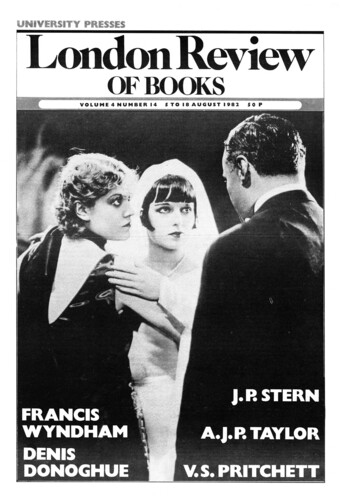Margot Heinemann
Margot Heinemann was until recently a fellow of New Hall, Cambridge. She was one of the editors of Culture and Crisis in Britain in the Thirties, where she wrote a piece on John Cornford, and is the author of a study of Jacobean drama, Puritanism and Theatre.
Brecht’s New Age
1 March 1984
Brecht’s New Age
Margot Heinemann, 1 March 1984
It’s probably a good thing that we know so little about Shakespeare’s personal life. What biographical information we have concerns leases, wills, marriage lines, property. His pillow-talk with Anne Hathaway, Emilia Lanier or Mr W. H., interesting as it may have been, was not recorded. If you want to discuss Shakespeare, you have to depend on reading and seeing his work. Not so with Brecht. Not only did he write a great deal of commentary himself. All those who knew him well were impressed, and by now almost every one of them has written a book or articles about him, or at least had one ghost-written. New biographies and studies keep appearing, along with interviews and hitherto unpublished letters and diaries, and it’s easy to forget about the words on the page (or stage).
Karl Korsch
5 August 1982
Modern Brecht
Margot Heinemann, 5 August 1982
‘Sacrilege sanctifies.’ Under this heading Brecht cheerfully sums up what happens to plays, like Shakespeare’s, that outlast their own time – and what may now be happening to his own:
Pieces about Margot Heinemann in the LRB
The Essential Orwell
Frank Kermode, 22 January 1981
Professor Crick’s subject is important and his research has evidently been diligent. We now know a lot more about Orwell than we did, and the increment of knowledge is not always trivial....
Plays for Puritans
Anne Barton, 18 December 1980
In Act II of Twelfth Night, Maria says of Malvolio – that poker-faced enemy of cakes and ale, bear-baitings, and all ‘uncivil rule’ – that ‘sometimes he is a kind of...
Read anywhere with the London Review of Books app, available now from the App Store for Apple devices, Google Play for Android devices and Amazon for your Kindle Fire.
Sign up to our newsletter
For highlights from the latest issue, our archive and the blog, as well as news, events and exclusive promotions.



